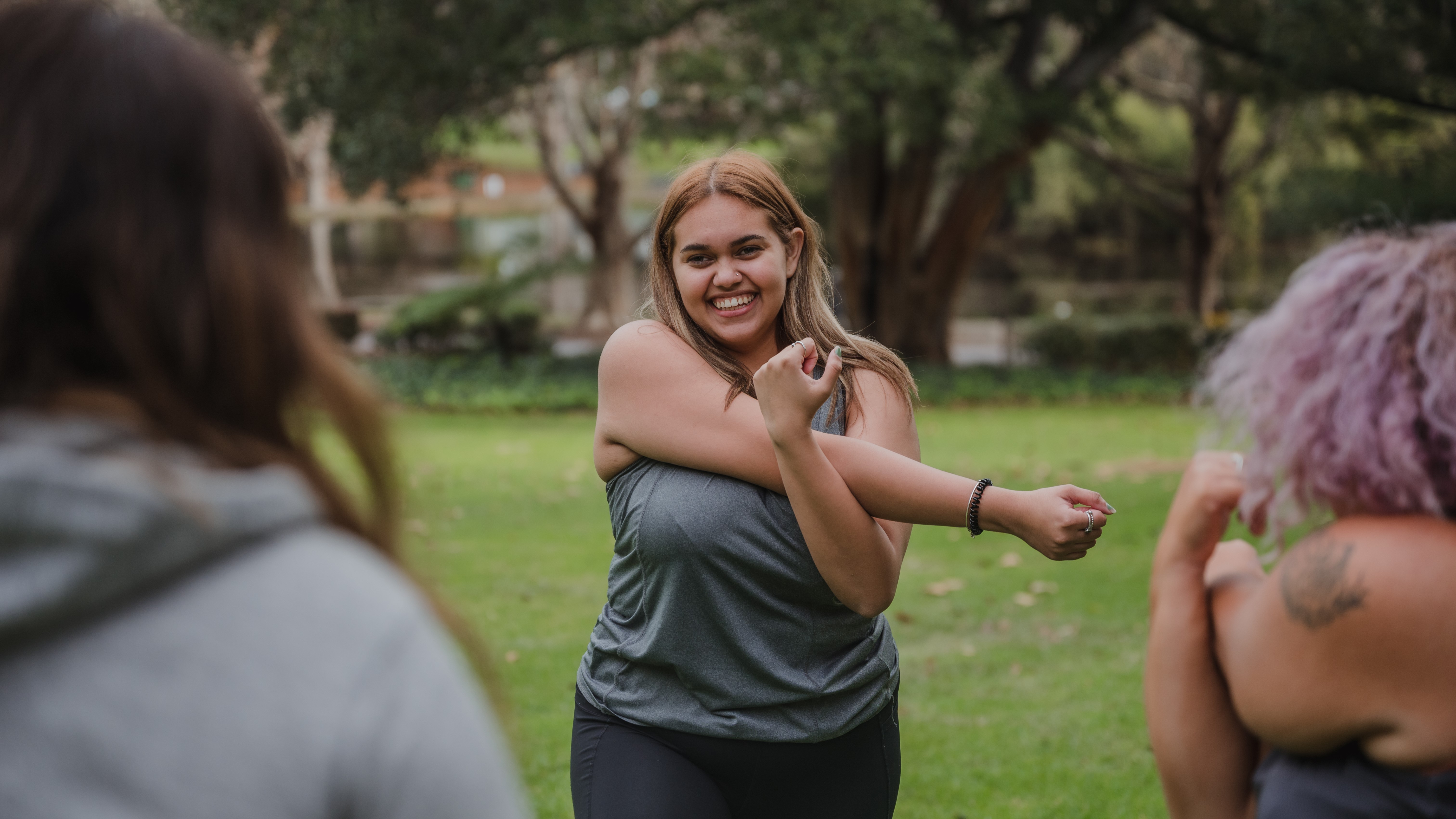
The physical benefits of exercise are well documented, but can you exercise for happiness? It's a common belief that exercise releases endorphins, which make you feel good, but why does this happen?
And while there are plenty of low-cost self care ideas you can use to look after your body and mind, it's not always clear whether you can use exercise to boost your wellbeing and improve your mental health.
The World Health Organization (WHO) recommends you should get at least 150 minutes of moderate to vigorous activity per week, spread over at least four days, to improve your physical health, but sticking to a regular training routine will also boost your emotional wellbeing.
If your goal is to boost your mood alongside your metabolism, exercise could reduce stress and improve your mood. We spoke to experts to explore exercise's role in producing those feel-good happy hormones and the mechanisms behind exercising for happiness.
Can you exercise for happiness?
In short, yes, exercise could help you feel happier. But we also recommend having other tools to safeguard your wellbeing in times of low mood, stress, or anxiety, like learning how to increase mental strength to help you deal with any curveballs life throws your way.
According to Adam Foster, director at The Fibro Guy Ltd, exercise is a well-established means of improving mental health. "One of the most widely recognized benefits is the sense of wellbeing and pleasure it provides," he says.
"The mechanisms behind this "feel-good" sensation are the result of a complex interplay between physiological and psychological processes." But why would your body respond like this to challenging physical activity?
Why does exercise feel good?
Foster explains that current research supports physical activity as a potent mood booster due to the hormones we release as we move. "Studies show that exercise stimulates the release of endorphins in the body, which are natural painkillers and mood elevators," Foster explains.
"Endorphins interact with the opiate receptors in the brain, producing a sense of euphoria and reducing the perception of pain." The release of endorphins provides a natural high that can last for hours after exercise.
Exercise also triggers the release of dopamine — a neurotransmitter that plays a crucial role in regulating mood and feelings of pleasure and satisfaction. A combination of dopamine and endorphins contribute toward positivity and reduced stress after a sweaty workout.
Endorphins and exercise: the feel-good connection
Luis Ribeiro, consultant physiotherapist and founder of Club Health rehab and performance clinic, adds that serotonin — a neurotransmitter also associated with happiness and wellbeing — is triggered by physical activity.
Bring serotonin, dopamine, and endorphins together — you've got a feel-good connection. Plus, a meta-analysis of published studies in the Journal of Psychiatric Research found that people who exercised regularly had lower levels of anxiety and depression than those who didn't.
Increasing mental strength through exercise

Exercise isn't just about physical health — although it's a huge bonus! People who exercise regularly also report feeling more energetic, relaxed, positive, and mentally sharp, especially those with mental health challenges.
"Exercise is a powerful medicine for common challenges, including depression, anxiety, ADHD, and stress," explains Foster. "By paying attention to the physical sensations in your body during exercise, you can improve your focus and attention, making it a powerful tool for reducing the symptoms of ADHD," he says.
Ribeiro adds that you could improve mental strength by challenging yourself physically and mentally through exercise. Tough workouts build resilience and help you cope better with life stressors.
One study published in the Journal of Sports Science and Medicine found that regular exercise improved cognitive function, including memory, attention, and processing speed. These improvements can result in increased discipline, accountability, and overall productivity.
To increase mental strength through exercise, Ribeiro recommends adding a challenge. For example, think about pushing through those last few exhausting minutes on the treadmill.
"This can mean trying a new activity or pushing yourself harder in your current exercise routine," advises Ribeiro, "But keep a consistent exercise routine, as this has been found to have the most significant impact on mental health."
Exercising outdoors for happiness

One of the best ways to tap into exercise for happiness is by taking your workout outdoors. The benefits of outdoor exercise include reduced stress, improved mood, and better sleep, which all play a vital role in maintaining your overall wellbeing.
"A large body of evidence that shows the immense benefits of doing this," Foster tells us. "One study published in Nature of 20,000 people found that those who spent two hours a week in nature were substantially more likely to report good psychological wellbeing than those who don't."
Likewise, a study in PLoS One found spending time outdoors could increase your sleep, while a separate paper in Medical Hypotheses suggests that the benefits from increased exposure to sun and nature, Foster reveals. There are many ways to start outdoor walking, like taking a stroll after dinner or a dog walk.
"Outdoor exercise has unique benefits compared with indoor workouts," Ribeiro agrees. "Studies have shown that spending time in nature lowers cortisol levels (the stress hormone) and boosts your immune system."
Outdoor exercise also allows you to connect with the environment through practices like forest bathing, which could improve feelings of overall connectedness.
How to start exercising for happiness
Although we know exercise is good for us (and makes us feel good), motivation could be hard to find if you're feeling low. The good news? You don't have to spend hours at the gym to access the therapeutic benefits of exercise.
Foster recommends 30 minutes of moderate exercise five times a week, which you can split into smaller sessions if you find it hard to carve out time for extended workouts.
And if you're short on time (who isn't), five-minute workouts could help you get started. "The key is to commit to some physical activity, no matter how little, on most days," he advises.
"The more you exercise, the more energy you'll have." This 20-minute mindful walking workout is an excellent starting point. We also asked fitness, wellness, and nutrition expert Penny Weston for tips suited for exercise beginners and regular gym bunnies.
"While you can't force happiness, you can do things to increase your endorphins," she says.
1. Experiment
"A workout doesn't have to be running for hours or lifting weights at a gym," she says. "The key is experimenting at a suitable level for you." Whether you enjoy high-intensity resistance training or low-impact exercises, go for it. Anything that you enjoy will encourage consistency.
2. Get outside
Again, outdoor exercise is a big tick. "Sunshine naturally boosts the production of the feel-good hormones, and fresh air will help you sleep better," she says.
While walking might not be the most strenuous form of exercise out there, the benefits of outdoor exercise can whip you into shape mentally and physically.
Weston advises taking your dog or seeking a dog walking service to source a canine companion. Let's face it, who doesn't feel happier around a puppy.
3. Try mindful walking
If furry friends aren't available, try taking a mindful walk. During bitesize meditation — like this short 10-minute walking workout — Weston says to focus your attention on the present moment.
"Take note of all the sensations your body is aware of. From the sounds around you to the feel of your clothes against your skin. Tune into your emotions and thoughts and try to observe them like a bystander, without judgment."







